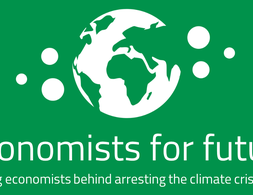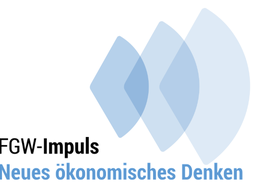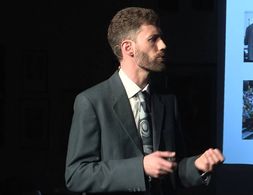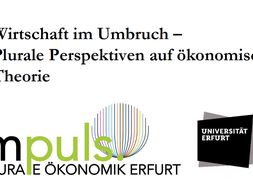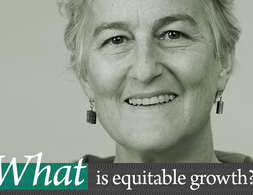1054 Ergebnisse
Verkehrte Welt in Sachen Fiskalpolitik Offener Mainstream und dogmatische Heterodoxie in Standardlehrbüchern der Volkswirtschaftslehre Achim Truger Quelle van Treeck Till and Janina Urban Wirtschaft neu denken Blinde Flecken in der Lehrbuchökonomie iRights Media 2016 Das Buch kann hier bestellt werden http irights media de publikationen wirtschaft neu denken Rezensierte Bücher …
Jede Finanzkrise ist in erster Linie eine Schuldenkrise. Schuldner_innen nehmen zu viele Kredite auf, die sie dann nicht mehr bedienen können. Gläubiger_innen – vor allem Banken – müssen in der Folge ihre Forderungen abschreiben und vergeben weniger Kredite. Die Finanzkrise ist da.
Um eine solche Finanzkrise wirklich zu verstehen, muss man aber erst begreifen, wie Kredite eigentlich entstehen und wie genau Banken und andere Finanzinstitutionen funktionieren. Aufgabe einführender Bücher in die Volkswirtschaftslehre sollte sein, diese fundamentalen Zusammenhänge darzustellen. Leider stellen diese Bücher das Finanzsystem und die Kreditschöpfung meist falsch dar. Das erschwert sowohl die Analyse einer Finanzkrise als auch Wege zu ihrer Lösung zu finden.
Der Umbau zu einer nachhaltigen, CO2-armen und solidarischen Ökonomie erfordert besonders in der Transformationsphase massive Investitionen sowohl in Institutionen und Infrastrukturen, die ein sozial gerechtes Leben für alle ermöglichen (ökologische Landwirtschaft, dezentrale erneuerbare Energien, ökologisches Wohnen, kollektive Mobilität etc.) als auch in Projekte zur Anpassung an und Entschärfung von Klimawandel und ökologischen Zerstörungen sowie finanzielle Transfers vom globalen Norden in den globalen Süden, die aus der historisch angehäuften Klimaschuld folgen.
In both economics textbooks and public perceptions central banks are a fact of life. On the wall of my A-level economics classroom there was the Will Rogers quote “there have been three great inventions since the beginning of time: fire, the wheel, and central banking”, summarising how many economists view the institution. There is a widespread belief that there is something different about money which calls for a central authority to manage its operation, a view shared even by staunch free marketeers such as Milton Friedman. This belief is not without justification, since money underpins every transaction in a way that apples do not, but we should always be careful not to take existing institutions for granted and central banking is no exception. In this post I will look at the idea of private or free banking, where banks compete (and cooperate) to issue their own currency.
Die ökonomische Theorie hat mit Moral wenig oder gar nichts zu tun. In den gängigen Lehrbüchern der Mikroökonomie findet sich in den Stichwortverzeichnissen kein Eintrag zu Moral oder Ethik. Die Studierenden lernen über die Wirtschaft nachzudenken, aber sie lernen dabei nicht, systematisch über ethische Fragen zu reflektieren. Nach der neoklassischen Lehre, wie sie in den Lehrbüchern präsentiert wird, weist wirtschaftliches Handeln nicht grundsätzlich moralische Aspekte auf.
Eine erfolgreiche Wirtschaftstransformation hängt von einer Veränderung der ökonomischen Praktiken der Akteure ab. Die „Spirale transformativen Lernens“ identifiziert, welche Fähigkeiten dafür entscheidend sind.
Lineares Wirtschaften ist trotz alternativer Vorschläge fest etabliert. Dabei wäre eine effektive Umsetzung der Kreislaufwirtschaft nötig, um den Fußabdruck menschlichen Konsums deutlich zu verringern. Ein Beitrag von Patricia Urban.
Diese Webseite widmet sich der Vielfalt bestehender ökonomischer Theorien und Methoden. Orientiere Dich, vergleiche, entdecke und studiere die unterschiedlichen ökonomischen Perspektiven.
Eine kritische Bestandsaufnahme des Standartlehrbuches „Grundzüge der Mikroökonomie“
Diese Studie widmet sich dem Zustand des Studiums der Volkswirtschaftslehre (VWL) aus der Perspektive seiner Studierenden.
In this TedTalk Dan O Neil explains why GDP and infinite growth are concepts that we should leave behind and which other perspectives have been developed Degrowth post growth well being or steady state economy The goal is to rethink a new paradigm that puts society and the environment at …
Die Wirtschaftswissenschaft steht heute im neoklassischen Paradigma, sie kann aber viel mehr als die meisten wissen. Im Laufe der Wirtschaftsgeschichte musste sich die ökonomische Theorie immer wieder neuen Herausforderungen stellen, neue Fragestellungen beantworten, ihre Zielsetzung und Wertkataloge hinterfragen und anpassen.
Die Notwendigkeit von Suffizienz als komplementärer Rahmen für Effizienz- und Konsistenzstrategien wird zunehmend anerkannt – die Rolle von Unternehmen in diesem Prozess jedoch meistens ausgeblendet.
Die alten kapitalistischen Zentren, aber auch die großen Schwellenländer befinden sich inmitten eines epochalen Umbruchs. Politikansätze, die das Problem der Klimaungerechtigkeit ignorieren, werden heftige Widerstände gegen die sozial-ökologische Transformation auslösen. Ein Beitrag von Klaus Dörre.
Ecological economics explores new ways of thinking about how we manage our lives and our planet to achieve a sustainable, equitable, and prosperous future. Ecological economics extends and integrates the study and management of both "nature's household" and "humankind's household"—An Introduction to Ecological Economics, Second Edition, the first update and expansion of this classic text in 15 years, describes new approaches to achieving a sustainable and desirable human presence on Earth.
Philosophy of Economics: A Contemporary Introduction is the first systematic textbook in the philosophy of economics introduces to the epistemological, metaphysical and ethical problems that arise in economics, and presents detailed discussions of the solutions that have been offered.
Though apparently siblings from the same family, New Keynesianism and Post-Keynesianism are completely different schools of economic thought. As to why and in what regard exactly, that is what this book is all about. While the former is the official label of the current mainstream in economic research and teaching (rather than neoclassic economics, which would be more apt a term), the latter tries to preserve the original thinking of John Maynard Keynes, but also additional ideas and concepts of all those building on his work.
This collection of videos offers a short introduction to ecological economics and its main differences with respect to environmental economics.
This film looks at the role economic growth has had in bringing about this crisis, and explores alternatives to it, offering a vision of hope for the future and a better life for all within planetary boundaries.
This course introduces students to the relevance of gender relations in economics as a discipline and in economic processes and outcomes.
Asset Management firms control large parts of the global economy Just the three American asset management firms BlackRock Vanguard and State Street manage more than half of the combined value of all shares for companies in the S P 500 Their combined managed assets amount to 22 trillion May 2022 …
A systematic comparison of the three major economic theories, showing how they differ and why these differences matter in shaping economic theory and practice.
Contending Economic Theories offers a unique comparative treatment of the three main theories in economics as it is taught today: neoclassical, Keynesian, and Marxian. Each is developed and discussed in its own chapter, yet also differentiated from and compared to the other two theories.
The Microeconomics of Complex Economies uses game theory, modeling approaches, formal techniques, and computer simulations to teach useful, accessible approaches to real modern economies.
p>Twenty-first-century economists will have to understand and improve a post-Cold War world in which no single economic theory or system holds the key to human betterment. Heterodox economists have much to contribute to this effort, as a wave of pluralism spawns new lines of research and new dialogues among non-mainstream economists.
Leigh Phillips and Michal Rozworski examine the apparent contradiction between the demise of real-existing socialism and the rise of large corporations engaging in planning every day, making a strong argument that these planning efforts should be transformed to now fulfil the needs of the people.
A Heterodox Approach to Economic Analysis This important new book introduces students to the fundamental ideas of heterodox economics presented in a clear and accessible way by top heterodox scholars It offers not only a critique of the dominant approach to economics but also a positive and constructive alternative Students …
This book is about history of monetary economic thought. From the 18th century with Hume and Smith to the early 20th, the author explains the different schools of thought regarding the monetary theories and policies and specially the central banking theory.
What do modern academic economists do? What currently is mainstream economics? What is neoclassical economics? And how about heterodox economics? How do the central concerns of modern economists, whatever their associations or allegiances, relate to those traditionally taken up in the discipline?
The volume, released by YSI’s Economic Development Working Group, comprises interviews with 13 scholars from around the world who express a variety of viewpoints on the meaning and relevance of dependency theory in today’s context.
Maria Nikolaidi on how Minsky’s theory has been modelled over past decades and how one can use these models in order to analyse contemporary issues such as financial fragility and financial instability caused by climate change.
What is “equitable growth” and how do we measure it? A better understanding of equitable growth—and how to measure it—can improve our understanding, inform decisions and lead to better outcomes for all.
To prevent the coronavirus shock to demand precipitating a long-lasting depression, government needs to become short-term payer of last resort.
Wir nutzen Cookies. Klicke auf "Akzeptieren" um uns dabei zu helfen, Exploring Economics immer besser zu machen!



